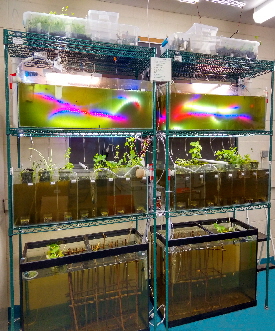|
Synthesis is one of the most promising pursuits of science. It tests knowledge, identifies challenges at the whole system scale, inspires new ideas, and generates new understanding.
We use the synthesis as an approach to ecology and a tool to build small ecosystems for advancing understanding as well as achieving practical solutions to a range of needs.
For example, designer ecosystems such as aquaponic fish and vegetable production fed by home and garden organic waste stream can supplement families or communities with organic food items, reduce waste removal costs, help maintain clean water, provide education, nature therapy, or hobby for people with time and energy to spare.
 A prototype of a small indoor ecosystem with compost compartments on top and fish at the bottom of the 4 step waste processing chain (compost-algae-invertebrates-fish), where water from fish is recycled to compost and algae. A prototype of a small indoor ecosystem with compost compartments on top and fish at the bottom of the 4 step waste processing chain (compost-algae-invertebrates-fish), where water from fish is recycled to compost and algae.
Designer ecosystems come in different forms and shapes and range from
These systems can also be a new tool for biodiversity use, protection, and education, with implications far beyond food production and immediate benefits to humans.
|